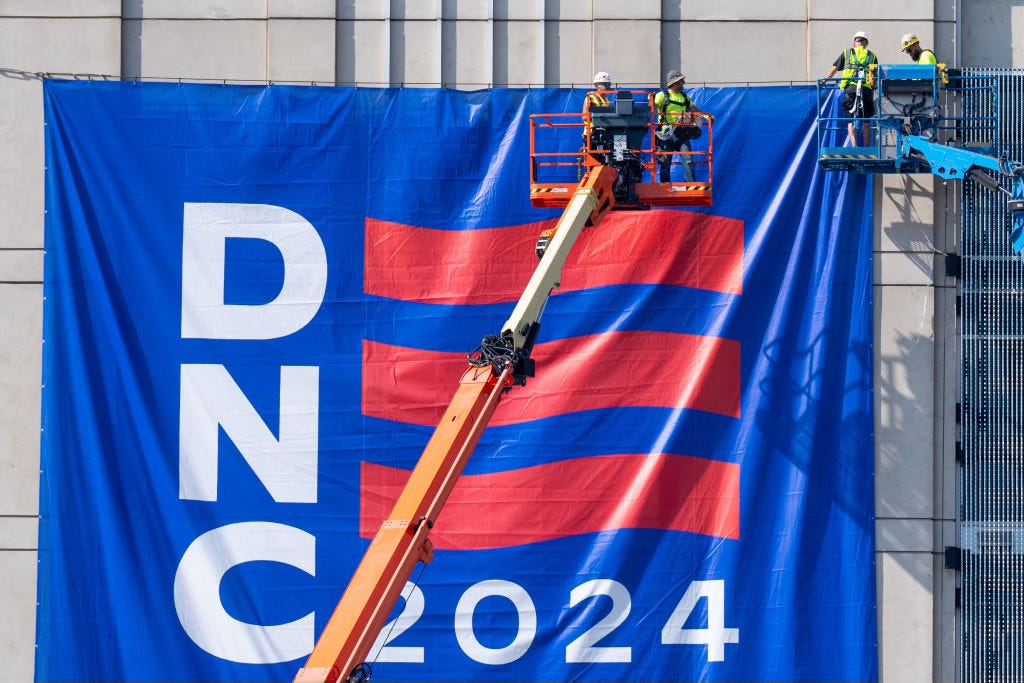Unburdened, the psychology of the Gaza war, climate change’s toll, the world in your microwave: Weekend reads for August 17, 2024
Some links worth your time this weekend
Less than a month into the Kamala Harris campaign, and with the Democratic National Convention coming up next week, the Democrats are in array like we haven’t seen in a long time. Polls have evened nationally, and Harris has pulled ahead in the critical swing states. Momentum is still building, the vibes are undeniable, and, as for the Republican ticket...well, they seem busy digging a deeper hole.
This week at The Ink, in advance of the convention, we have launched a new interview series called “Unburdened” (to borrow from Kamala Harris’s catchphrase), in which we interview some of the smartest policy minds out there, asking them to envision a truly bold Harris agenda that would materially improve people’s lives.
The aim is to get beyond the vibes (though vibes are great, too!) and look at what a Harris-Walz White House could actually achieve — and we’re not talking about the usual hedged, safe, and realistic ideas, but about transformational policies that are truly unburdened by what has been.
We’ll be rolling out more interviews in the series in the coming weeks. And next week Anand will be on the ground in Chicago, so watch your inbox through the week for his dispatches from the convention floor. (Leave a comment here to tell him what you’d most like him to track from there.)
Meanwhile, in this week’s readings — the links we pull together for our paid subscribers each weekend — we’ve collected some fascinating links on everything else that’s been going on, from Omer Bartov’s harrowing and sympathetic look into the contemporary Israeli psyche to new work on the human cost of climate change, to a new study on the strange microscopic world that thrives within your familiar kitchen appliances.
A request for those who haven’t yet joined us: The interviews and essays that we share here take research and editing and much more. We work hard, and we are eager to bring on more writers, more voices. But we need your help to keep this going. Join us today to support the kind of independent media you want to exist.
In case you missed it
The second edition of our unburdened series featuring Matthew Duss — former foreign policy advisor to Senator Bernie Sanders — was a wide-ranging discussion imagining what a truly post-neoliberal foreign policy that benefits laborers at home and abroad might look like.
Again, the United States government's first responsibility, first and foremost, is to the people of the United States. But making a pitch not only here but globally to say, Listen, we want to raise worker standards. We want to raise labor standards. We want to protect labor's right to organize. That’s a very powerful message.
We also spoke with former Secretary of Homeland Security under Obama, Jeh Johnson about addressing the root causes of border security, campaigning as a Democrat with a law enforcement background, and how the threats to national security have evolved since he left office in 2017.
All of this is to say that there are answers. You could just pull 'em out of your top desk drawer and say, here are the answers to fixing the system. But they are politically unobtainable. And the reason they are politically unobtainable is because the political actors on both sides of the spectrum have made the judgment, whether consciously or unconsciously, that for political reasons, it's better to leave the system unfixed and just accuse the other side of being horrible, evil, weak or whatever.
Sociologist Jessica Calarco talked to us about her new book, Holding it Together: How Women Became America’s Safety Net, which does what it says on the box. Our discussion began with the cultural origins of the pernicious American myth of self-sufficiency and how that has persisted through the COVID-19 pandemic and beyond, preventing societal progress at the expense of gender equality at every step along the way.
The unpaid and underpaid labor that women do to fill in the gaps in our social safety net and in our economy makes us complacent, makes us feel as though we don't maybe actually need a social safety net because we're doing well enough with the minimal social safety net that we do have. And yet at the same time, this is crushing women. They're the default caregivers for children, for the sick, and for the elderly. They're the ones who fill the lowest-paid jobs in our economy. 70 percent of our lowest-wage jobs are held by women.
Anand wrote about how the example set by Tim Walz gives us hope and optimism for a pluralistic future that’s nearly in sight — one that includes older white guys happily and enthusiastically participating without being left behind. A future beyond the influence of Rupert Murdoch’s manipulations.
Dads who lovingly braided their daughters’ hair and practiced spelling bee words with them now malign their freedoms and the people they love and the families they have made. They were stolen. People want their families back. And this is going to become a theme of this campaign.
Anand also discussed the unexpected energy and potential of our unprecedented political moment on Vanity Fair’s Inside the Hive podcast with host Brian Stelter. You can listen to the full episode here: [Apple] [Spotify] [PRX]
I want us to feel like so damn excited about immigration. So damn excited about the free life you can live when you have control over your body. About the amazing things a mind can do when it's allowed to read whatever it wants.
I think we can be amazing. And we too often are reacting to their conversation instead of having our own.
Readings
Shall the sword devour forever?
Those gates of Gaza are lodged deeply in the Zionist Israeli imagination, a symbol of the divide between us and the “barbarians”. In the case of Ro’i, Dayan asserted, “the longing for peace blocked his ears, and he did not hear the voice of murder waiting in ambush. The gates of Gaza weighed too heavily on his shoulders and brought him down.” [The Guardian]








